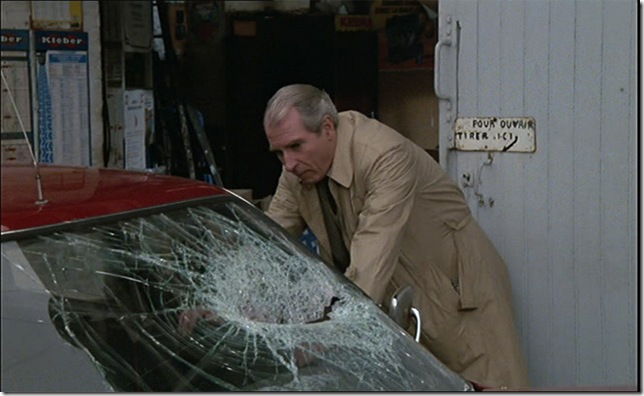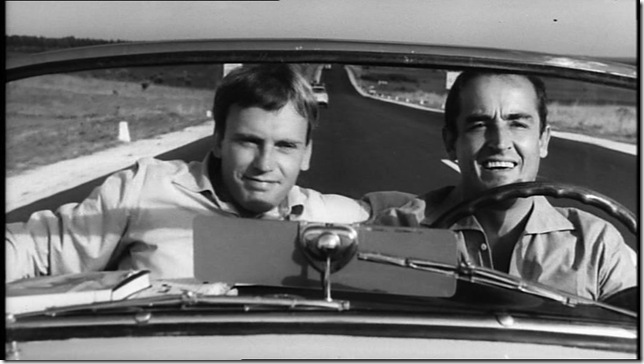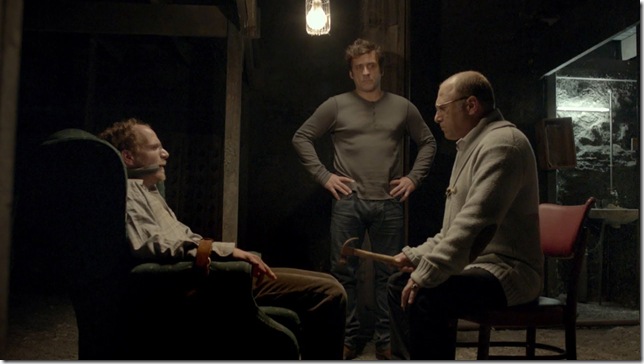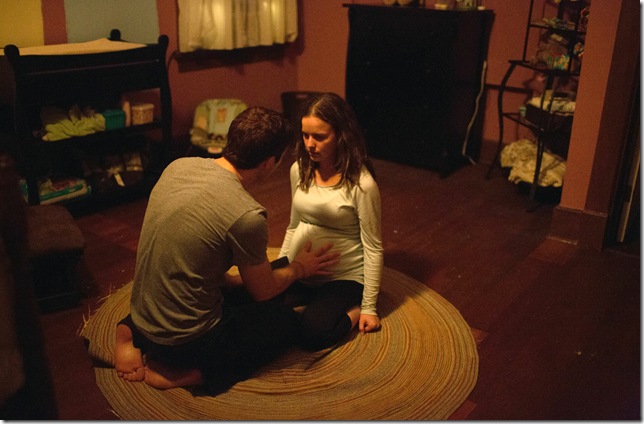The Inspector Lavardin Collection: Back in 1984, Claude Chabrol, one of the French New Wave’s darkest chroniclers of the human condition, emerged from a period of artistic infertility to introduce one of the most underrated detective protagonists of modern times.
That’s when he directed his first film with Inspector Jean Lavardin, played by the French comic actor Jean Poiret, who would appear in three more Lavardin films for Chabrol and a short-lived French television series. This gorgeous box set from Cohen Media Group ($44.99 Blu-ray, $34.99 DVD) compiles the first two, in immaculate transfers with crisp subtitles.
Rather than repurposing the academic gentility of Conan Doyle’s Sherlock Holmes, Poiret’s Lavardin’s calm demeanor is deceptive. Moral rectitude trumps police ethics, and his investigations are defined by his sudden streaks of unscrupulous savagery. His introductory movie, Poulet au Vinaigre (Chicken With Vinegar), is slow going at first, because we don’t encounter Lavardin until 40 minutes in. He takes on a case of mutual corruption — economic, moral, you name it — between a grumpy, widowed invalid and the vulturine group of developers who want to remove her from her manse and take her land. Neither side is worth the viewer’s sympathy, and it takes Poiret’s appearance to shake up the cobwebs and provide the movie its pulse and its edge.
He beats up a suspect — the landowner’s coddled son — until he coughs blood, and he basically waterboards one of the unctuous realtors. In some ways, Lavardin is in the pantheon of the Dashiell Hammett/Raymond Chandler detective, with no past, future, hobbies or emotions to speak of beyond his pugnacious pursuit of justice. He’s possibly psychopathic, yet he’s the only likeable character in this two-hour nest of bourgeois comeuppance, and Chabrol wonderfully revels in the sordidness of it all.
The director’s follow-up, 1985’s Inspecteur Lavardin (Inspector Lavardin), is considerably funnier than its predecessor, and is just as eccentric in different ways. This time, Lavardin descends on a provincial town, where the body of a wealthy, pious writer has washed up naked on the beach, with the word “pig” scrawled across his back in garish lipstick. The suspects include a touring theater troupe whose latest production, “Our Father Who Farts in Heaven,” was banned in town by the writer. There’s also the man’s strange brother-in-law, whose hobbies include painting glass eyes onto marbles and displaying his creepy oculi for all to see, and to see all.
Unlike Chicken With Vinegar, in which Lavardin hurtles mid-film like a dogged dervish, this time we spend the entire movie with him, and even get a sense of his backstory. He once shared a romance with the corpse’s twice-widowed spouse (Bernadette Lafont), though he’s not the kind of cop to let sentimentality cloud his judgment. In fact, Lavardin is the perfect avatar for Chabrol, who judged the high crimes and misdemeanors of reckless upper-class swindlers and adulterers throughout his generous corpus. In these two titles, he created a character just as a pointed and provocative as his films, as both director and actor wade through the bourgeois muck.
Il Sorpasso: Il Sorpasso (Criterion, $23.99 Blu-ray + DVD, $15.99 DVD), the classic 1962 road comedy from underrated director Dino Risi, is quintessentially Italian in its rambunctious, expansive approach to screen life; Road Movie, Italian Style could have been an alternative title. But it’s universal in its competing archetypes, which have defined the culture-clash buddy comedy across decades and regions.
Cruising around Rome in his convertible Lancia Aurelia, a free-spirited rebel named Bruno (Vittorio Gassman) stops outside the apartment of shy, milquetoast law student Roberto (Jean-Louis Trintignant) to use his phone. To repay Roberto for his time and trouble, Bruno takes the young man out for a bite to eat that turns into two nonstop days of lurching, law-breaking, car horn-blaring anarchy along the coasts of Lazio and Tuscany, from family stopovers to restaurant brawls to beachside bacchanals, with Roberto gradually coming out of his shell and inhabiting his reckless companion’s persona.
Gassman’s performance as Bruno is iconic, the devil-may-care id to Trintignant’s anchoring ego. And through each episodic diversion, their adventures continue to reveal surprises about both men, namely that Bruno’s bravado masks a hidden past and latent insecurities — that his perpetual postponement of tomorrow is a result of unquiet desperation, not boundless joie de vivre. The movie’s tragic ending will alienate some, but I found it brave and uncompromising — daring and modern in its lack of logic and moral “sense.” Criterion’s superlative package include a full-length 2006 documentary about the film, excerpts from a few other docs, some archival interviews, and an introduction by Alexander Payne, who cites Il Sorpasso’s significant influence on his own Sideways.
Big Bad Wolves: Pre-apocalyptic music and slow-motion effects accompany a children’s game of hide and seek in the prologue to the Israeli shocker Big Bad Wolves (Magnolia, $14.96 Blu-ray, $12.96 DVD), creating a sense of creeping dread over a scene of otherwise innocent play. It won’t be the only example of generic dissonance in this unforgettable foray into subversive torture porn from writer-directors Aharon Keshales and Navot Papushado.
Most of the movie takes place in the capacious basement of a remote fixer-upper, where Gidi (Tzahi Grad), the father of a recently slaughtered girl, has shackled two onetime enemies turned companions: Dror (Rotem Keinan), a meek teacher initially accused of the murder but released due to lack of evidence; and Micki (Lior Ashkenazi), a rogue detective whose myopic pursuit of Dror cost him his badge. The rest of the film is too sick to describe, yet too mordantly comic to stop watching.
An appreciative blurb from Quentin Tarantino accompanies the Blu-ray’s cover art, but even this master of black comedy hasn’t gone as far Keshales and Papushado do here, whether it’s the sprightly cell-phone jingle of Gidi’s nagging mother interrupting his torture session, the deployment of Buddy Holly’s “Everyday” over a poison pie-baking montage, or some hilarious banter about Arab-Israeli prejudice between Micki and an Arabic, horse-bound traveler.
Wherever it turns, Big Bad Wolves uses unexpected comedy to quell its barely relenting sadism, playing with audience expectation in a way not seen since The Cabin in the Woods, or maybe even Michael Haneke’s Funny Games. By its brutal, weak-kneed ending, after a few brilliantly executed twists and turns, you might feel ashamed for laughing at such unspeakable horror.
Devil’s Due: Few movies about satanic possession and the Antichrist have felt as inconsequential as Devil’s Due (Fox, $19.99 Blu-ray + DVD combo pack, $14.99 DVD), the feature debut from indie horror directors Matt Bettinelli-Olpin and Tyler Gillett.
Allison Miller and Zach Gilford play Samantha and Zach McCall, a newly married pair of typically privileged, inarticulate, vanilla millennials whose sudden vanquishing from the planet would be nobody’s loss. Bettinelli-Olpin and Gillett are apparently of the horror-movie persuasion that if the protagonists are one-dimensional and obnoxious, we can guiltlessly revel at the nasty fate that befalls them.
In this case, it’s the implantation of a devil seed into Samantha’s womb, administered after a kidnapping on their honeymoon. She wakes up the next morning unawares, is surprised to find that she’s pregnant the following week, and proceeds through the inevitable parade of gross reactions to her satanic fetus: weird bruises, hair loss, gushing nosebleeds, bouts of uncontrollable rage, scratching devilish symbols into the floorboards of their home, an ability to cripple priests with a single red-eyed stare.
This entire adventure is “documented” as a video diary by Zach, who wields his camera around like a fifth appendage, recording everything for posterity. It’s a schematic and implausible conceit for this movie’s directors, who break their own rules whenever it’s convenient for the narrative or their storyboards. What could have been a frighteningly uncomfortable commentary on bodily changes during pregnancy is instead just another half-baked, found-footage trifle that doesn’t come close to selling us on the gravity of its nonsense.



